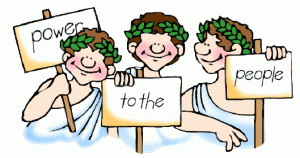It pays to be a democracy, if you discount the chaos
 The most prosperous countries in the world – 27 of the top 30 – are democracies. The poorest nations on earth are not. This simple mathematical equation has led the Legatum Institute to list the democratic deficit as a sizeable handicap (the main one) for countries like Nigeria, Togo, Haiti (138 of 142 countries on the 2012 Index) and the Central African Republic.
The most prosperous countries in the world – 27 of the top 30 – are democracies. The poorest nations on earth are not. This simple mathematical equation has led the Legatum Institute to list the democratic deficit as a sizeable handicap (the main one) for countries like Nigeria, Togo, Haiti (138 of 142 countries on the 2012 Index) and the Central African Republic.
It’s tied in to those other solid, but hard-to-replicate, features: good governance and rule of law. Either you have them or you don’t. If not, getting to the point of acquiring them is a challenge. And the status quo is likely to stay unchanged in the interim. Howsoever long that lasts. Perhaps, as with Equatorial Guinea, nearly 35 years, which is the term of its current ruler.
The Legatum Prosperity Index has been in existence since 2010, when the private, UAE-based, investment organisation’s London Institute created a ranking that included factors such as wealth, economic growth, personal well-being, and quality of life. It uses data from Gallup, the World Trade Organization, UN Human Development Report, World Bank etc. And it considers important, if subjective criteria such as the amount of personal freedom allowed in a country. This includes freedom of speech and religion and tolerance for immigrants and racial minorities.
Democracy can be messy reiterated the Institute as it released its 2013 report, just ask the Americans, whose government was recently shut down for 16 days and nearly defaulted on its debt as a result of partisan policy disagreements. But at the end of the day, democratic systems based on good governance and the rule of law are more conducive to prosperity than any of the alternatives.
“It’s governance and the rule of law, stupid.”

